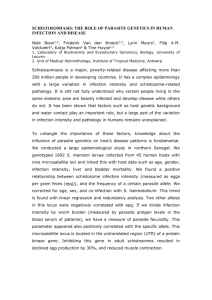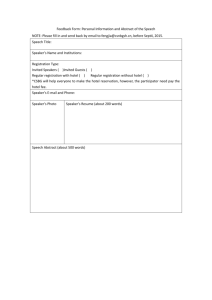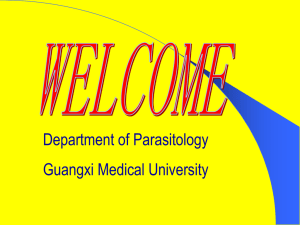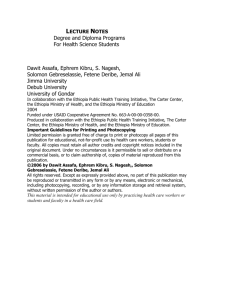script number 147 intestinal parasites
advertisement
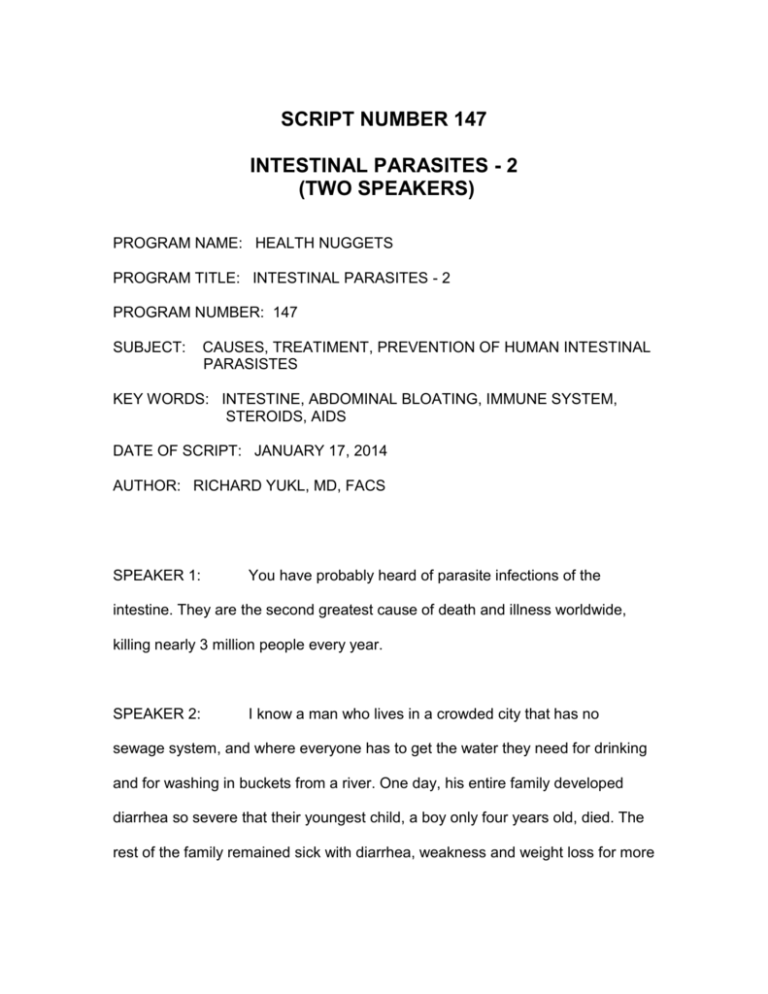
SCRIPT NUMBER 147 INTESTINAL PARASITES - 2 (TWO SPEAKERS) PROGRAM NAME: HEALTH NUGGETS PROGRAM TITLE: INTESTINAL PARASITES - 2 PROGRAM NUMBER: 147 SUBJECT: CAUSES, TREATIMENT, PREVENTION OF HUMAN INTESTINAL PARASISTES KEY WORDS: INTESTINE, ABDOMINAL BLOATING, IMMUNE SYSTEM, STEROIDS, AIDS DATE OF SCRIPT: JANUARY 17, 2014 AUTHOR: RICHARD YUKL, MD, FACS SPEAKER 1: You have probably heard of parasite infections of the intestine. They are the second greatest cause of death and illness worldwide, killing nearly 3 million people every year. SPEAKER 2: I know a man who lives in a crowded city that has no sewage system, and where everyone has to get the water they need for drinking and for washing in buckets from a river. One day, his entire family developed diarrhea so severe that their youngest child, a boy only four years old, died. The rest of the family remained sick with diarrhea, weakness and weight loss for more than a month. The cause proved to be intestinal parasites from contaminated water. SPEAKER 1: What are intestinal parasites? SPEAKER 2: They are worms or one-celled organisms that live in our intestine. They can live anywhere in our body, but they prefer the intestinal wall. There, they use our blood and our body’s waste as their food. They are a problem because, when they infect our intestine, they destroy our ability to absorb the food we have eaten, and that causes diarrhea. Intestinal parasites can also pass through our intestinal wall and use our blood stream to spread to other organs such as our liver or our lungs, causing severe and even lifethreatening disease. SPEAKER 1: How do you become infected with parasites? SPEAKER 2: Parasites are spread through human and animal waste. Infected waste sometimes finds its way into our drinking water, and into the water we use to grow our food. People living in developing countries are at an increased risk of infection because their water can become contaminated due to inadequate sewage treatment. That was the case with the family of which I spoke. Children are also at increased risk because they come into contact with infected dirt in places such as sandboxes and school playgrounds. SPEAKER 1: How does my body fight a parasite infection? SPEAKER 2: God designed each of us with an immune system that can successfully fight infections such as those caused by parasites. Unfortunately, some people’s immune systems have become weakened. Cancers such as lymphoma, and virus infections such as AIDS weaken our immune system. Medical conditions requiring steroid treatments, and medicines used to fight cancer also weaken our immune system, and a weakened immune system increases our risk of developing a parasitic infection. SPEAKER 1: What symptoms will let me know I have a parasite infection? SPEAKER 2: Symptoms include mucous-containing diarrhea that can be mild or severe. Diarrhea appears several days to several weeks after the infection, and it usually lasts several days to several months. Your belly bloats, and you will develop a lot of gassiness. Weight loss is common. A vitamin deficiency often develops, so you may feel tired and notice tingling in your arms or legs. At times, unfortunately, there are no symptoms whatever to warn you of your danger. SPEAKER 1: How are parasite infections treated? SPEAKER 2: Medicines that can kill parasites are now available. A doctor must prescribe these medicines. Even though the medicines are usually successful in killing the infection, it can return unless the source of the infection is also destroyed. SPEAKER 1: Talk about the sources of a parasite infection. SPEAKER 2: We can become infected either by direct with the parasite, or by indirect contact. SPEAKER 1: Talk about direct contact. SPEAKER 2: There are three ways that direct contact with a parasite can cause infection. The most common way is through person-to-person spread - a person or pet with the infection touches you, allowing the parasite to spread directly from their skin to yours. Handling infected waste is the second way the parasite can spread. Infected waste contains live parasites as long as the infection lasts, and even months to years after the symptoms have stopped. Finally, an infected mother can pass the parasite to her unborn baby through her blood stream. SPEAKER 1: What about indirect contact? SPEAKER 2: Live parasites can remain on objects such as doorknobs for long periods of time. When you touch a doorknob that was previously contaminated by someone with parasites on their skin, those parasites can transfer to your hands. Another important way parasites can spread by indirect contact is through contaminated food and water. Fruit and vegetables that have been grown using contaminated water may have live parasites on their surfaces. If you eat them without first washing or cooking them, you can become infected. SPEAKER 1: So, what can I do to prevent developing a parasitic infection? SPEAKER 2: Remember that parasite infections result from either direct or indirect contact. Wash your hands with soap before eating. Bathe your children after they play outdoors. Eat only the raw fruit whose skin you can peel. Wash your vegetables with clean water. If necessary, boil that water to be sure it is safe. The family who became infected and lost their youngest child to a parasite infection might have saved themselves from disaster had they followed these guidelines. Washing food in clean or boiled water removes parasites that may be present on the food’s surface, and boiling or cooking food kills the parasites that may be present within the food. Drink only bottled water and drinks when you travel. Other ways to avoid infection are to never share your toothbrush, comb, razor, drinking glasses or eating utensils with anyone. SPEAKER 1: What else should I know about parasites? SPEAKER 2: If you have had an intestinal infection that has been treated, get retested to be sure the parasites are truly gone. Carefully follow your doctor’s advice concerning ways you can avoid reinfection. A parasite reinfection can cause even more serious health problems. SPEAKER 1: Health Nuggets is written by Dr. Richard Yukl, a medical doctor working in the United States. The medical views expressed in this program are his and may differ for your particular health needs. If you need medical advice, please consult a medical professional in your area.



